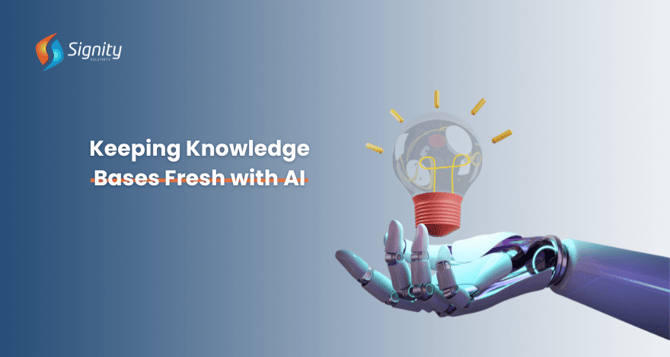Keeping Knowledge Bases Fresh and Up-to-Date with AI
Organizations depend on knowledge bases for crucial functions like decision-making and customer service. However, keeping these bases updated presents ongoing challenges. With AI, updating becomes automated, allowing for seamless integration of new information. Dive into this article to explore how AI revolutionizes knowledge base maintenance with practical examples.

Knowledge bases are vital for organizations, serving as key sources for decision-making and customer support. However, keeping them updated is challenging due to ever-changing information. To tackle this, organizations are adopting AI to automate updates. This article explores how AI can help and offers code examples.
The Maintenance Challenge of Knowledge Bases
Knowledge bases are dynamic entities, demanding continuous attention to remain pertinent. Common hurdles organizations encounter in maintaining knowledge bases include:
Content Aging:
Knowledge-based information naturally becomes outdated over time due to product updates, policy changes, and evolving best practices.
Data Volume:
Manually managing large knowledge bases can be overwhelming, necessitating efficient methods for tracking and organizing vast amounts of information.
User-Generated Content:
Knowledge bases often rely on contributions from users, which can introduce errors and inconsistencies.
Search Relevance:
As knowledge bases expand, finding relevant information becomes increasingly difficult, leading users to struggle with locating the appropriate content.
Harnessing AI for Knowledge Base Maintenance
Artificial intelligence presents several solutions to tackle the challenges of knowledge base maintenance. Below, we outline AI-powered techniques alongside corresponding code snippets for implementation:
1. Content Monitoring
AI can continuously monitor external sources for relevant updates and alterations. For example, web scraping techniques can extract information from websites and news sources. Generative AI development companies specializing in web scraping solutions can facilitate this.
import requestsfrom bs4 import BeautifulSoupdef scrape_website(url): response = requests.get(url) soup = BeautifulSoup(response.text, 'html.parser') # Extract relevant content from the website # Update your knowledge base with the new information |
2. Natural Language Processing (NLP)
NLP techniques aid in comprehending and processing user-generated content, ensuring adherence to knowledge base standards and guidelines. ChatGPT developers specialize in NLP solutions, which is where their expertise comes in.
import spacynlp = spacy.load("en_core_web_sm")def analyze_text(text): doc = nlp(text) # Perform entity recognition, sentiment analysis, and more # Use the results to validate and enrich your knowledge base entries |
3. Chatbots and Virtual Assistants
Integrating chatbots or virtual assistants into knowledge bases facilitates swift and accurate information retrieval for users. Utilize AI-powered chatbot frameworks like Rasa or Dialogflow, which were developed by companies specializing in conversational AI, such as ChatGPT developers.
# Example using Rasa frameworkfrom rasa.nlu.model import Interpreterfrom rasa.core.agent import Agentnlu_model = Interpreter.load("path/to/nlu/model")core_model = Agent.load("path/to/core/model")def query_bot(user_message): intent, entities = nlu_model.parse(user_message) response = core_model.handle_message(user_message) # Provide the bot's response to the user |
4. Recommender Systems
Implement AI-driven recommender systems to suggest pertinent articles or information based on user queries and preferences. This can be accomplished using collaborative filtering techniques with libraries like Surprise, which are commonly employed by AI development companies specializing in recommendation systems.
# Example using collaborative filtering with Surprise libraryfrom surprise import Dataset, Readerfrom surprise import KNNBasicfrom surprise.model_selection import train_test_splitreader = Reader(rating_scale=(1, 5))data = Dataset.load_from_df(ratings_df, reader)trainset, testset = train_test_split(data, test_size=0.2)sim_options = {'name': 'cosine', 'user_based': False}model = KNNBasic(sim_options=sim_options)model.fit(trainset)# Use the model to make recommendations |
Conclusion
Keeping your knowledge base up-to-date is crucial for accuracy and informed decisions.
Elevate Your Business with Custom AI Solutions
Our AI development services offer a tailored approach to meet your specific business needs. Let's discuss your project today!
AI tools like content monitoring, NLP, chatbots, and recommender systems streamline maintenance. Integrate these solutions to ensure your knowledge base stays fresh. With help from AI development companies and ChatGPT experts, managing your knowledge base becomes easier.


%201-1.webp?width=148&height=74&name=our%20work%20(2)%201-1.webp)


.png?width=344&height=101&name=Mask%20group%20(5).png)

















